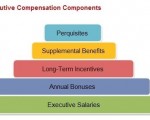
Compensation an overview
Compensation management is one of the most challenging human resource areas because it contains many elements and has a far-reaching effect on the organisation’s goals. The purpose ...

Elements of Executive Compensation
At the heart of most executive compensation plans is the idea that executives should be rewarded if the organization grows in profitability and value over a period of years. Because ...
Skill Based Pay
Skill-based pay refers to a pay system in which pay increases are linked to the number or depth of skills an employee acquires and applies and it is a means of developing broader and ...
Dos and Don’ts
1. Do carefully craft the design of the plan to the specific needs of the organization.
It is almost impossible to borrow any other organization’s design. For the plan to have a solid ...

Two objectives influence executive compensation
Two objectives influence executive compensation:
<=1=> Ensuring that the total compensation packages for executives are competitive with the compensation packages in other firms ...

What Are the Components of Executive Compensation?
=> Base salary
=> Incentive pay, with a short-term focus, usually in the form of a bonus
=> Incentive pay, with a long-term focus, usually in some combination of stock awards, option ...

Executive Compensation
Compensation or remuneration for the executive managers is different from compensation for other employees in most the organizations. Executive compensation covers employees that include ...
How do we get employee acceptance of the system?
Acceptance of SBP is a basic change management issue. Clearly, employees need to understand how they can make more money under the system, and need a realistic idea of how long it will ...
What are the critical issues in union settings?
Compensation is a collective bargaining issue in union settings, so the union must partner in the design process. There are many SBP examples in union settings, and SBP designs do not ...
What are the most favorable conditions for SBP?
The most basic condition for success is that there is a wide range (in depth and or breadth) of skills, knowledge, or competency for employees to acquire and use in their jobs. SBP ...
